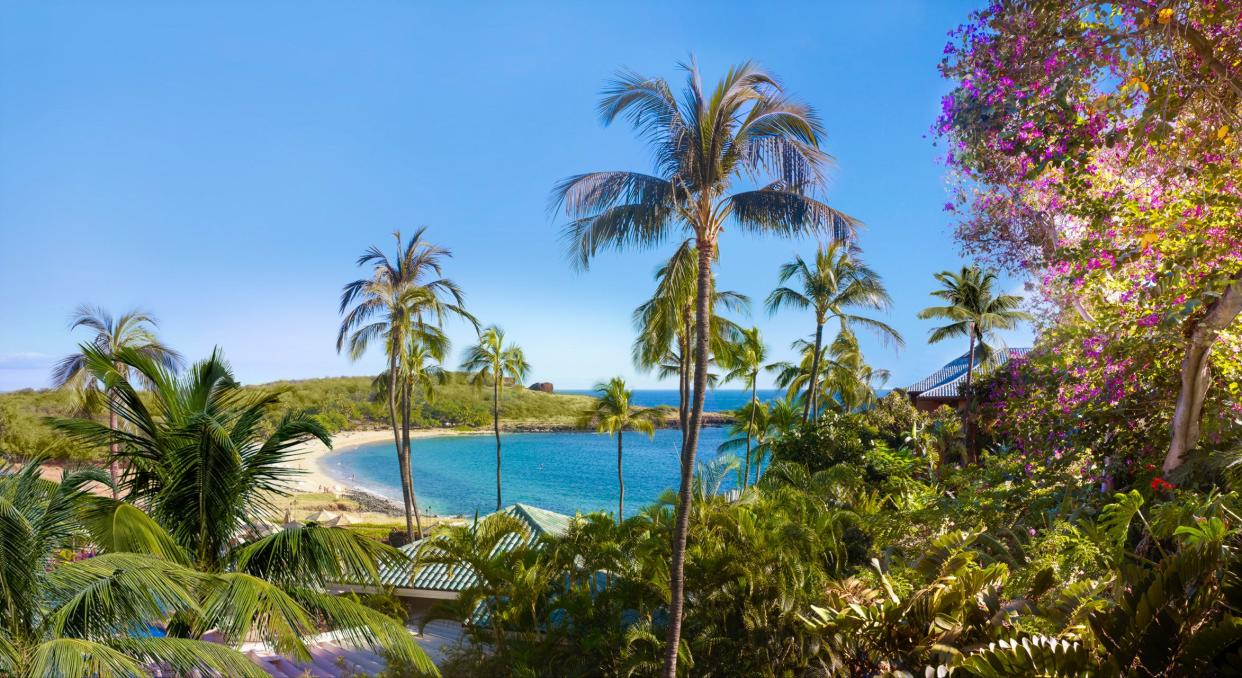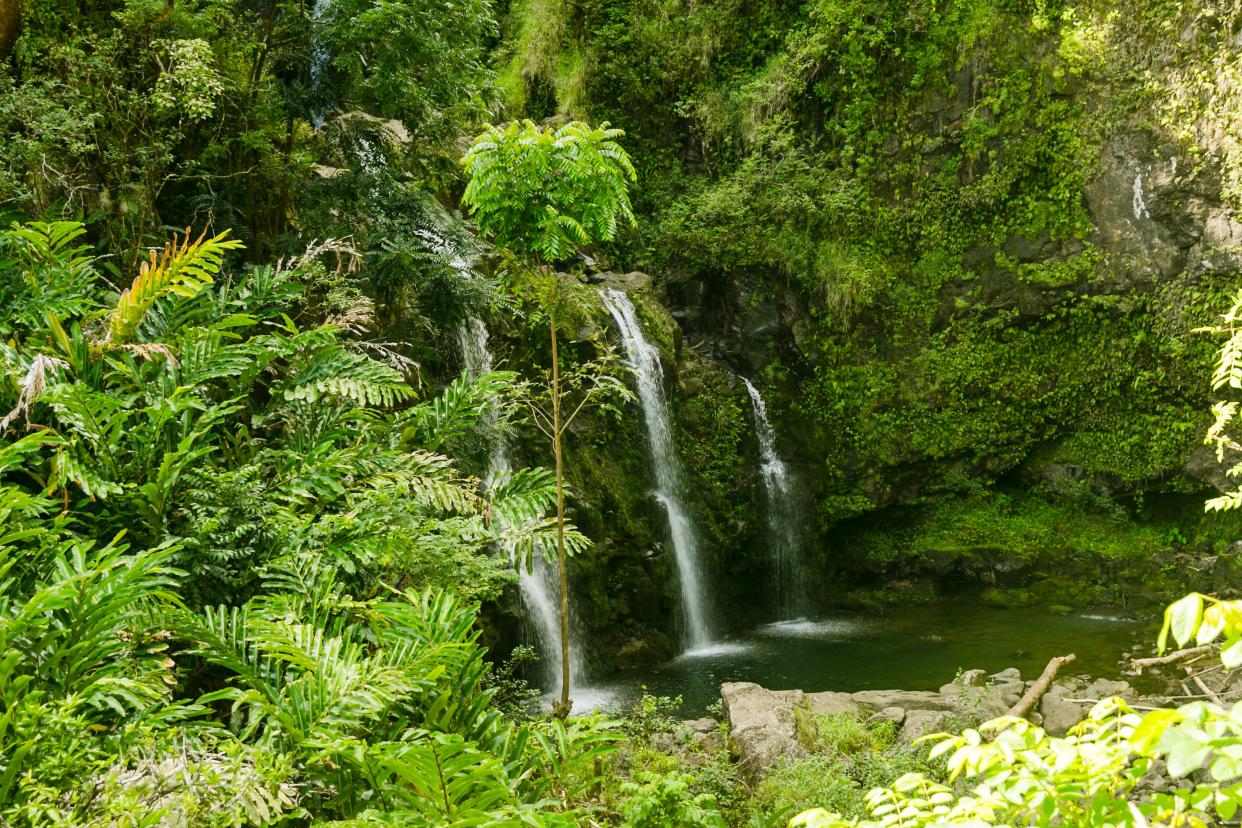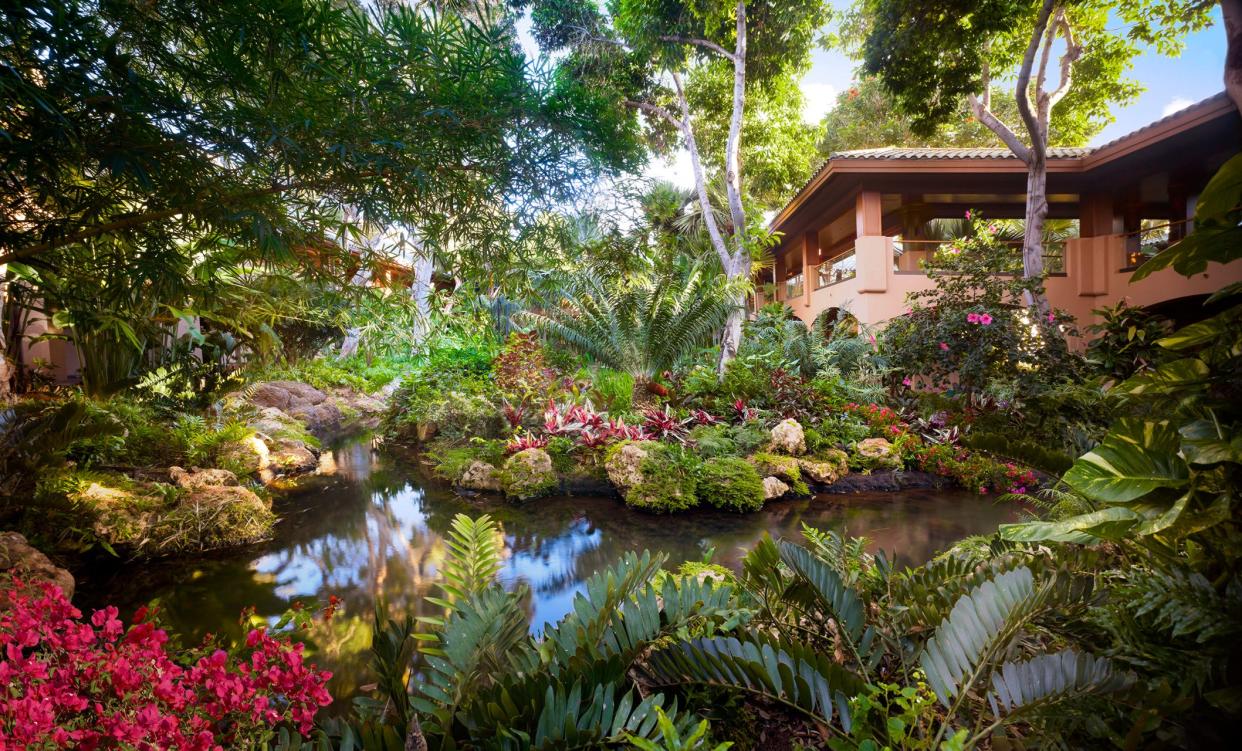Coral reefs are dying. What one Hawaii resort is doing to help.
"Green Travel” is a six-part series focusing on what it means to be sustainable travelers, how the industry is moving the needle on greener efforts, and how consumers can reduce their carbon footprint when exploring. If you'd like to contribute to our future reporting and share your experience as a source, you can click here to fill out this quick form.
MAUI, Hawaii – The largely undeveloped island of Lanai has a single gas station, a few paved roads and no traffic lights. If you're coming from Oahu or Maui, you may be surprised at the lack of buildings. With one of the smallest populations of all the inhabitable Hawaii islands, Lanai is noticeably quiet.
On the south shore of the island sits one of its three hotels, the Four Seasons Lanai Resort. Fitting seamlessly into Lanai's aesthetic, the resort's 12 acres are highly curated to look like an unspoiled tropical paradise.
Like most Hawaii resorts, the Four Seasons Resort Lanai is oceanfront. The Manele and Hulopoe Marine Sanctuary are steps away, making humpback whales, turtles, spinner dolphins and monk seals common sightings for guests.
It's this harmony between land and sea that inspired Robert Woodman, director of landscaping at the resort, to completely upend how he and his team maintained the hotel grounds. Woodman recognized that the way we take care of the land has a direct impact on the marine life below.

In early 2023, the resort became the first ever to receive gold certification for the Reef Friendly Landscaping Program from the Maui Nui Marine Resource Council (MNMRC), a nonprofit working toward healthier oceans by combining community, culture and science-based solutions. The resort now runs on 100% organic landscaping.
"Guests come to our resorts to experience a world that is different to what they have at home," Woodman told USA TODAY. "Many have never seen a turtle swimming while snorkeling or had breakfast watching spinner dolphins leap in the bay as they sip on their coffee. While we offer a guest that experience, we also have a responsibility to protect the very environment people come to see."
A 'touchy situation' in Hawaii: The opening of the world's largest standing wave pool draws criticism
Sustainable Hawaii tourism: What it's like to stay at Kauai's first zero-waste hotel
How does landscaping affect Hawaii's oceans?
"We know our reefs are under a lot of stress as it is," Jill Wirt, project manager for MNMRC, told USA TODAY. A 2015 bleaching event wiped out half of Hawaii's coral reefs, and most were off of Hawaii Island and Maui's shores. In the worst-case scenario, scientists say coral reefs could be extinct in 30 to 50 years.
Warmer climates and human impact have contributed to hurting reefs, including chemical-based landscaping products like Malathion and Permethrin. Runoff from fertilizers, pesticides and herbicides has been found to cause additional harm. These chemicals can cause algae bloom that deplete oxygen from the water, coral bleaching and developmental and reproductive issues in marine life. Unfortunately, these chemicals are the norm.
"It's been known there's a lack of organic alternatives," Wirt said.
What is organic landscaping?
Organic landscaping aims to maintain soil and plant health through chemical-free management.
When it comes to conventional landscaping, Duane Sparkman, a Maui-based environmental consultant who works with MNMRC and helped Woodman with the transition, calls it a "chemical treadmill" in which you're constantly adding chemicals on top of each other. Synthetic materials end up hurting the soil substrate, while organic products work to recover the microbes and fungal chains in the soil.
It goes back to an ancient Hawaiian concept called the ahupuaa, or a district where the mountain (mauka) is directly connected to the sea (makai) in a self-sustaining ecosystem, Sparkman said.
"You can go out to East Maui, and it's a fully functional system without any additives," Wirt said, referring to Hana, a lush rainforest setting that attracts many visitors. "We can do it in a hotel environment as well."

How can a Hawaii hotel start with reef-friendly landscaping?
In 2022, MNMRC launched the Reef Friendly Landscaping Program to offer free hands-on support for Hawaii resorts to transition away from harmful landscaping chemicals and hold the properties accountable for their impact on marine life.
"I genuinely do think that properties want to do the right thing but don't know where to start, and that's where the program comes in," Wirt added.
When resorts start the program, they share their entire product list with MNMRC, who then sends over a consultant to help the resort come up with organic alternatives that will suit their needs. For gold-level certification, one employee from the landscaping team must also become an accredited organic land care professional.
According to Woodman, it took the Four Seasons Lanai Resort eight months to transition to organic. However, Sparkman said he and Woodman have been collaborating on bringing more organic landscaping practices to Hawaii for several years.
Molokini Island: This popular snorkeling spot on Maui has been 'overused' from tourists, scientists warn
Cheap eats in Hawaii: 8 of the best local dining spots in Waikiki

The process wasn't difficult either, according to Woodman, but it was challenging at times.
"Being on an island is at times like being on the moon, in that there are always extra steps to take to get things on or off our land," he said. For example, it was a long process to find a company that could safely dispose of the remaining chemical inventory. After months of paperwork and permits, they were able to get an Oahu-based company to ship the products to Washington for controlled disposal.
Is organic landscaping harder, more expensive?
Organic products are more labor-intensive at first, and require manual removal of weeds and repeat applications compared to "one and done" chemical products.
Once the soil balances out, "you let the microbes do their business," Sparkman said. The bottom line for cost isn't a big difference either, he said. Getting the products to Hawaii is the issue.
Sparkman hopes that if more hotels transition to organic products, the increase in demand will change the supply chain.
Following the news of the Four Seasons Lanai Resort achieving becoming the first certified Hawaii resort with reef-friendly landscaping, MNMRC is now working with properties across Maui County on transitioning to organic landscaping, such as the Royal Lahaina Resort, the Four Seasons Resort Maui at Wailea and Makena Golf and Beach Club.
"We can become so focused on what we see with the plants growing in or landscapes that we might forget that there's an entirely different world under the waves," Woodman said.
Since going organic, Woodman said his team has noticed a change in the insects and wildlife on the property. In the past, they would've sprayed for caterpillars, but now see birds hunting for them to feed their young. "Now that we’ve stopped using them, praying mantis, spiders, ladybugs, dragonflies and lizards are providing the balance."
"I just saw a nest with a bunch of baby birds when walking the gardens," he added. "We've ordered bird feeders and baths and also bee/bug hotels, so looking forward to seeing more flourish."
Does a resort's green practices affect your decision to stay there? Why or why not?
Kathleen Wong is a travel reporter for USA TODAY based in Hawaii. You can reach her at kwong@usatoday.com
This article originally appeared on USA TODAY: What is coral reef-friendly landscaping, why this resort was certified